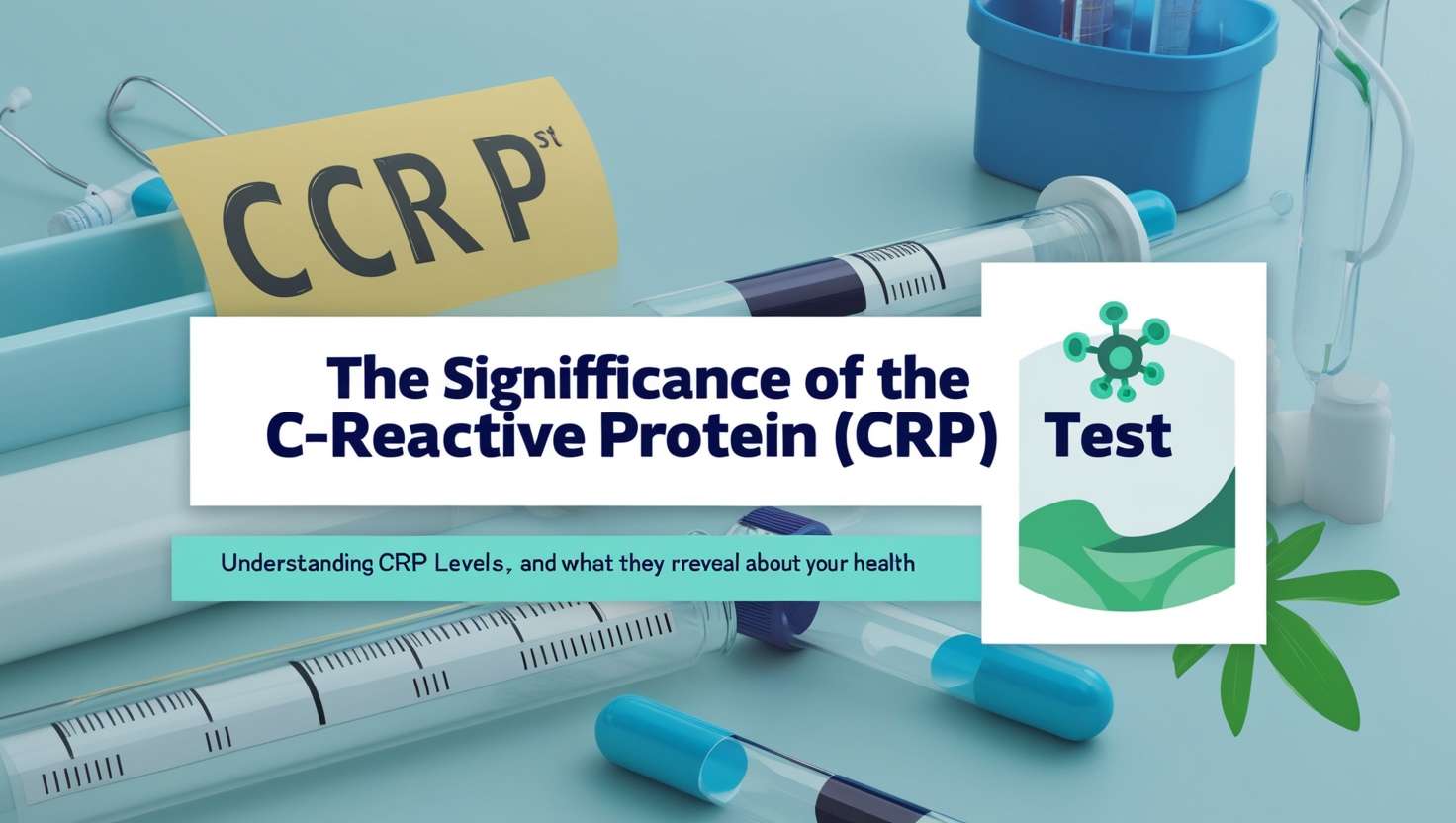Understanding C-Reactive Protein (CRP) and Its Role in Your Health
C-reactive protein, or CRP, is an important marker of inflammation in our body. When CRP levels are high, it can mean there are health issues. These could include heart disease, autoimmune disorders, or infections. A straightforward blood test can measure your CRP levels. Doctors use this test to check the risk of heart disease and to watch over inflammatory conditions. Knowing your CRP level is important for catching problems early and managing health issues effectively. It is a good idea to have regular CRP tests, especially for people with chronic conditions or a family history of heart disease.
SEE ALSO : TMC Full Form Explained: Everything You Should Know
Key Highlights
- A C-reactive protein (CRP) test measures the level of CRP, a protein produced by the liver in response to inflammation, in your blood.
- Elevated CRP levels can indicate various conditions, including infections, autoimmune diseases, and an increased risk of heart disease.
- The CRP test is nonspecific and doesn’t pinpoint the exact location or cause of inflammation, so additional tests may be necessary.
- Managing elevated CRP levels often involves lifestyle modifications such as quitting smoking, maintaining a healthy weight, and managing stress.
- If you have concerns about your CRP levels or experience persistent symptoms of inflammation, it’s crucial to consult your healthcare provider.
Introduction
A C-reactive protein (CRP) test is helpful for doctors who want to check the inflammation levels in the body. This test alone cannot diagnose health issues, but high CRP levels can be important. They can show if there are infections and help identify the risk of heart disease. Doctors can also use these levels to manage chronic health conditions that involve inflammation. Knowing about CRP levels can help people make better choices about their health and seek the right medical help when needed.
SEE ALSO : ADSL Unleashed: 9 Reasons Why Asymmetric Digital Subscriber Line Will Rock Your Internet World🚀
What is CRP and Why Does It Matter ?
CRP is an important part of the body’s defense system. It is a special protein that shows signs of inflammation. This helps your healthcare provider know if something is wrong. When there is inflammation, CRP levels increase quickly, giving useful information about your health.
Inflammation is a natural response. It is how the body heals and protects itself. When you get hurt, have an infection, or face a long-term illness, your immune system sends out cells to help. These cells cause reactions that lead to swelling, redness, and pain while fixing the damage.
Monitoring CRP levels assists healthcare providers in gauging the severity of inflammation and the effectiveness of treatment. In short, CRP is a useful tool for diagnosing, managing, and possibly preventing different health conditions.
SEE ALSO : Etcetera: What Does Etc. Stand For ?
The Connection Between CRP Levels and Inflammation
The link between CRP and inflammation is clear. When your body faces a health issue, like a small cut or a long-term problem such as cardiovascular disease or inflammatory bowel disease, it creates an inflammatory response. This makes your liver make more CRP, leading to higher levels in the bloodstream.
Think of CRP levels like a gauge for measuring how much inflammation is happening in your body. Higher levels usually mean more inflammation. Acute infections can make CRP spike temporarily, but if the levels stay high, it might show there is ongoing inflammation that needs care.
Regularly checking CRP is important, especially for people with chronic conditions. It can give helpful information about disease activity and how well treatments are working. By monitoring CRP levels closely, healthcare providers can better decide if treatment plans need to change and can help stop disease from getting worse.
SEE ALSO : Jio Full Form : All You Need to Know
The CRP Test : What You Need to Know Before Getting Tested
What is the CRP Test?
- Purpose: Measures the amount of C-reactive protein (CRP) in your blood to assess inflammation levels.
- Common Uses: Detecting inflammation, monitoring chronic inflammatory conditions, assessing risk for heart disease.
Preparing for Your CRP Test
Preparation Steps:
- No Special Preparation Required:
- Fasting or other specific preparations are not needed for the CRP test.
- Inform Your Healthcare Provider:
- Medications and Supplements: List all medications (prescription and over-the-counter), vitamins, and herbal supplements you are taking. Some substances can affect CRP levels.
- Health Conditions: Share any ongoing health issues or symptoms with your healthcare provider.
- Day of the Test:
- Dress Comfortably: Wear clothing that allows easy access to your arm for the blood draw.
- Address Needle Anxiety: If you are anxious about needles, inform the healthcare provider. They can use techniques to ease discomfort and anxiety.
The Testing Process: What Happens During a CRP Test
- Seating:
- You will be seated in a comfortable chair for the duration of the test.
- Locating the Vein:
- The healthcare provider will find a suitable vein in your arm, typically in the inner elbow area.
- Cleaning and Drawing Blood:
- The area where the needle will be inserted is cleaned with an antiseptic.
- A small needle is inserted into the vein to draw a small amount of blood into a sterile vial.
- Post-Draw Care:
- After collecting the blood, the needle is removed, and the site is pressed to stop bleeding.
- A bandage is applied to the puncture site.
- Duration and Discomfort:
- The entire process usually takes a few minutes and is generally quick and minimally painful.
Interpreting Your CRP Test Results
| CRP Level (mg/L) | Interpretation |
|---|---|
| < 1.0 | Normal: Low levels of inflammation. |
| 1.0 – 3.0 | Mildly elevated: Minor inflammation, potentially due to infections or chronic conditions. |
| 3.0 – 10.0 | Moderately elevated: Significant inflammation, possible infections, autoimmune disorders, or other inflammatory conditions. |
| > 10.0 | Markedly elevated: Severe inflammation, associated with serious infections, major injuries, or autoimmune disease flare-ups. |
SEE ALSO : TAT Full Form: All You Need to Know & More
Additional Insights on CRP Levels
| Aspect | Details |
|---|---|
| Health Risks of High CRP Levels | High CRP levels are linked to increased risk of heart disease, autoimmune diseases, and chronic conditions. |
| CRP and Heart Disease | Elevated CRP can indicate inflammation in arteries, raising heart disease risk. Regular monitoring is crucial for prevention. |
| CRP and Autoimmune Disorders | High CRP levels in autoimmune diseases like rheumatoid arthritis can reflect disease activity and treatment efficacy. |
| CRP and Chronic Conditions | CRP levels are associated with conditions like inflammatory bowel disease, COPD, and some cancers. Monitoring helps in managing these diseases. |
Managing Elevated CRP Levels: A Guide to Better Health
| Lifestyle Change | Impact on CRP Levels |
|---|---|
| Maintain a Healthy Weight | Reduces inflammation and lowers CRP levels. |
| Quit Smoking | Smoking cessation decreases CRP levels and inflammation. |
| Regular Physical Activity | Regular exercise helps reduce inflammation and CRP levels. |
| Manage Stress | Effective stress management lowers CRP levels by reducing inflammation. |
When to Consult a Healthcare Professional About Your CRP Levels

Understanding CRP levels is important. However, it’s essential to have a healthcare provider interpret the test results and decide on the best actions. Treating yourself based only on CRP levels can be dangerous. It may lead to a delay in getting the medical care you need.
Talk to your healthcare provider if you have ongoing or getting worse symptoms, even if your CRP levels are normal. Also, if your CRP levels are very high, but you feel fine, it is still important to look further into it.
Your healthcare provider will look at many factors. This includes your symptoms, medical history, and other test results. They will provide you with an accurate diagnosis and treatment plan. They can also help with any concerns you have and advise you on how to reach better health.
The Impact of CRP Levels on Chronic Diseases
| Chronic Condition | Relevance of CRP Levels |
|---|---|
| Heart Disease | Elevated CRP levels can indicate increased risk and inflammation in cardiovascular diseases. |
| Rheumatoid Arthritis | High CRP levels reflect disease activity and help in adjusting treatment. |
| Inflammatory Bowel Disease | CRP levels assist in monitoring disease flare-ups and managing treatment. |
| COPD | Higher CRP levels may be linked to disease exacerbations and severity. |
| Cancer | Elevated CRP can be associated with some cancers and can aid in monitoring disease progression. |
Conclusion
Understanding C-Reactive Protein (CRP) and its importance for your health is very important. High CRP levels can show signs of inflammation and possible health issues. It is essential to manage these levels by making lifestyle changes and talking to healthcare professionals if necessary. Regular tests and understanding your CRP results can give you helpful information about your health and help you take preventive steps. Stay aware of how CRP levels affect chronic diseases, like heart disease and other health issues. Make your health a priority by taking steps to keep your CRP levels healthy for overall well-being and to prevent diseases.




Опыт людей, прошедших чистку лимфы солодкой и полисорбом: отзывы
продукты для низкоуглеводной диеты .
Элитные шубы из соболя: как подчеркнуть статус и стиль
соболиная шуба цена .
Современный дом престарелых: всё, что нужно для комфорта и безопасности
дом для пожилых москва.
Вскрытие замков в Санкт-Петербурге: какие услуги предлагают профессионалы
замена замка входной двери спб .
Как установить винтовую сваю 57 мм: пошаговое руководство
купить винтовые сваи 57 мм дешево.
Почему Kugoo V3 Pro — лучший электровелосипед для активного отдыха
электровелосипед kugoo kirin v3 pro plus .